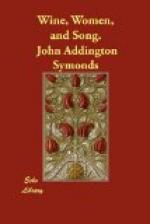We in our wandering,
Blithesome and squandering,
Tara, tantara, teino!
Eat to satiety,
Drink with propriety;
Tara, tantara, teino!
Laugh till our sides we split,
Rags on our hides we fit;
Tara, tantara, teino!
Jesting eternally,
Quaffing infernally:
Tara, tantara, teino!
Craft’s in the bone of us,
Fear ’tis unknown of us:
Tara, tantara, teino!
When we’re in neediness,
Thieve we with greediness:
Tara, tantara, teino!
Brother catholical,
Man apostolical,
Tara, tantara, teino!
Say what you will have done,
What you ask ’twill be done!
Tara, tantara, teino!
Folk, fear the toss of the
Horns of philosophy!
Tara, tantara, teino!
Here comes a quadruple
Spoiler and prodigal!
Tara, tantara, teino!
License and vanity
Pamper insanity:
Tara, tantara, teino!
As the Pope bade us do,
Brother to brother’s true:
Tara, tantara, teino!
Brother, best friend, adieu!
Now, I must part from you!
Tara, tantara, teino!
When will our meeting be?
Glad shall our greeting be!
Tara, tantara, teino!
Vows valedictory
Now have the victory;
Tara, tantara, teino!
Clasped on each other’s breast,
Brother to brother pressed,
Tara, tantara, teino!
In the fourth place I insert the Confession of Golias. This important composition lays bare the inner nature of a Wandering Student, describing his vagrant habits, his volatile and indiscriminate amours, his passion for the dice-box, his devotion to wine, and the poetic inspiration he was wont to draw from it.
In England this Confession was attributed to Walter Map; and the famous drinking-song, on which the Archdeacon of Oxford’s reputation principally rests in modern times, was extracted from the stanzas II et seq.[29] But, though Wright is unwilling to refuse Map such honour as may accrue to his fame from the composition, we have little reason to regard it as his work. The song was clearly written at Pavia—a point inexplicably overlooked by Wright in the note appended to stanza 9—and the Archbishop-elect of Cologne, who is appealed to by name in stanza 24, was Reinald von Dassel, a minister of Frederick Barbarossa. This circumstance enables us to determine the date of the poem between 1162 and 1165. When the Confession was manipulated for English readers, Praesul Coventrensium, Praesul mibi cognite, and O pastor ecclesiae were in several MS. redactions substituted for Electe Coloniae. Instead of Papiae, in stanza 8, we read in mundo; but in stanza 9, where the rhyme required it, Papiae was left standing—a sufficient indication of literary rehandling by a clumsy scribe. In the text of the Carmina Burana, the Confession winds up with a petition that Reinald von Dassel should employ the poet as a secretary, or should bestow some mark of his bounty upon him.




